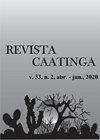Essential oils in the management of Alternaria alternata f. sp. citri in ‘Dancy’ tangerine fruits
IF 0.9
4区 农林科学
Q3 AGRONOMY
引用次数: 0
Abstract
ABSTRACT Tangerines and their hybrids are affected by economically essential diseases. The Alternaria brown spot (Alternaria alternata f. sp. citri) deserves to be highlighted, as it is present in all tangerine production areas. This study aimed to determine the effect of essential oils on A. alternata f. sp. citri. The experiments were carried out in the Laboratories of Phytopathology and Biology and Technology of Post-Harvest of the Federal University of Paraíba, Areia, PB. Three pathogen isolates were used, and ten essential oils from grape, sunflower, eucalyptus, ginger, copaiba, mint, fennel, citronella, clove, and linseed at a concentration of 1%, diluted in potato dextrose agar for in vitro tests. The oils were diluted in distilled water for the fruit test, and the fruits were immersed in the treatments for 5 min. In addition, the fungicide Thiabendazole (400 mL/100L) and sterile distilled water were used as the control treatments. The fruits were inoculated with a conidia suspension of the pathogen (105 conidia/mL). Mycelial Growth Rate Index, colony diameter, spore production and dimensions, fruit disease severity, and enzymatic activity were evaluated. A completely randomized design was used, with 12 treatments and four replications in vivo. The results indicate that the essential oils of mint, eucalyptus, fennel, and citronella were efficient in the in vitro control of the pathogen, ultimately inhibiting the growth of fungal colonies. Eucalyptus oil efficiently managed A. alternata f. sp. citri on ‘Dancy’ tangerine fruits. Essential oils did not influence the enzymatic activity of the fruits.精油在治理‘丹西’蜜橘中的Alternaria alternata f.sp.citri中的作用
摘要:柑橘及其杂交种受到经济上重要疾病的影响。链格孢褐色斑点(Alternaria alternata f.sp.citri)值得强调,因为它存在于所有的柑橘生产区。本研究旨在确定精油对A.alternata f.sp.citri的影响。实验在宾夕法尼亚州阿雷亚帕拉伊巴联邦大学的植物病理学、生物学和收获后技术实验室进行。使用了三种病原体分离株,并将来自葡萄、向日葵、桉树、生姜、科帕巴、薄荷、茴香、香茅、丁香和亚麻籽的十种精油以1%的浓度稀释在马铃薯葡萄糖琼脂中进行体外测试。将油在蒸馏水中稀释用于果实试验,并将果实浸泡在处理中5分钟。此外,使用杀菌剂噻苯达唑(400mL/100L)和无菌蒸馏水作为对照处理。用病原体的分生孢子悬浮液(105分生孢子/mL)接种果实。对菌丝生长速率指数、菌落直径、孢子产量和大小、果实病害严重程度和酶活性进行了评估。采用完全随机设计,共进行12次治疗和4次体内复制。结果表明,薄荷、桉树、茴香和香茅的精油在体外控制病原体方面是有效的,最终抑制了真菌菌落的生长。桉树油有效地治理了‘丹西’柑橘果实上的A.alternata f.sp.citri。精油对果实的酶活性没有影响。
本文章由计算机程序翻译,如有差异,请以英文原文为准。
求助全文
约1分钟内获得全文
求助全文
来源期刊

Revista Caatinga
AGRONOMY-
CiteScore
2.10
自引率
11.10%
发文量
67
审稿时长
6-12 weeks
期刊介绍:
A Revista Caatinga é uma publicação científica que apresenta periodicidade trimestral, publicada pela Pró-Reitoria de Pesquisa e Pós-Graduação da Universidade Federal Rural do Semi-Árido – UFERSA, desde 1976.
Objetiva proporcionar à comunidade científica, publicações de alto nível nas áreas de Ciências Agrárias e Recursos Naturais, disponibilizando, integral e gratuitamente, resultados relevantes das pesquisas publicadas.
 求助内容:
求助内容: 应助结果提醒方式:
应助结果提醒方式:


